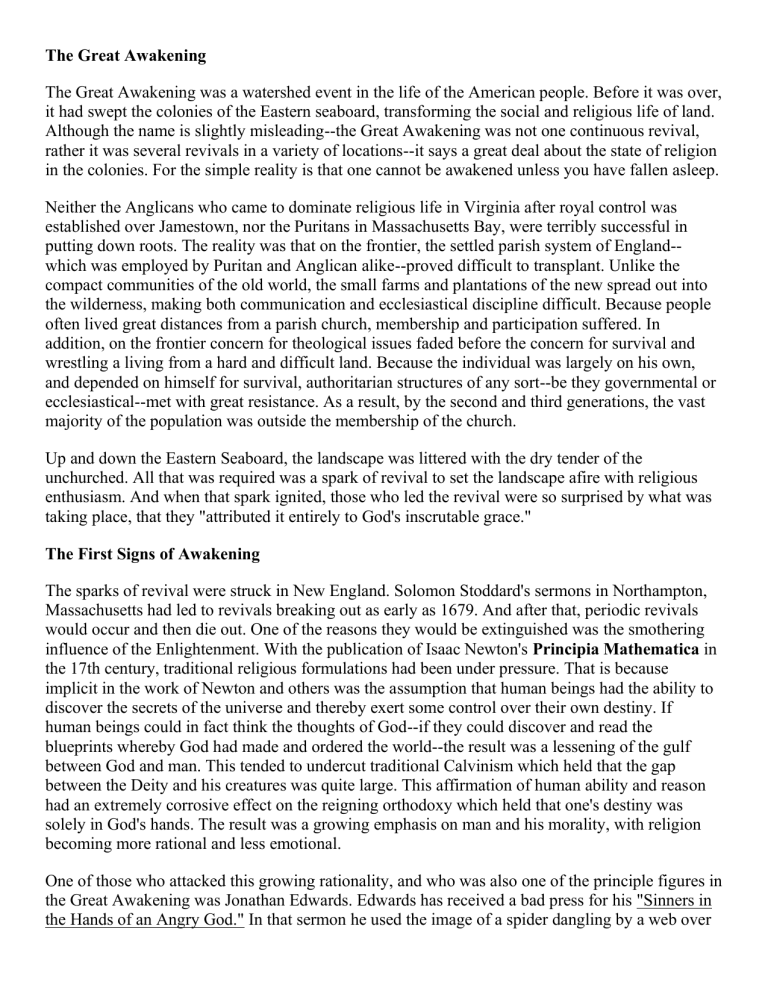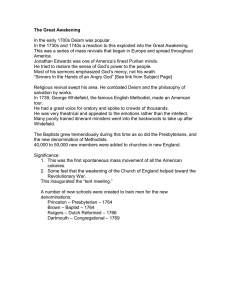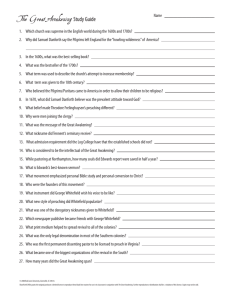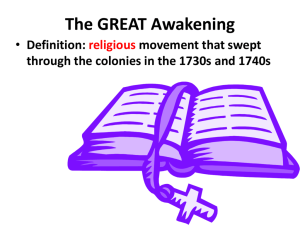
The Great Awakening The Great Awakening was a watershed event in the life of the American people. Before it was over, it had swept the colonies of the Eastern seaboard, transforming the social and religious life of land. Although the name is slightly misleading--the Great Awakening was not one continuous revival, rather it was several revivals in a variety of locations--it says a great deal about the state of religion in the colonies. For the simple reality is that one cannot be awakened unless you have fallen asleep. Neither the Anglicans who came to dominate religious life in Virginia after royal control was established over Jamestown, nor the Puritans in Massachusetts Bay, were terribly successful in putting down roots. The reality was that on the frontier, the settled parish system of England-which was employed by Puritan and Anglican alike--proved difficult to transplant. Unlike the compact communities of the old world, the small farms and plantations of the new spread out into the wilderness, making both communication and ecclesiastical discipline difficult. Because people often lived great distances from a parish church, membership and participation suffered. In addition, on the frontier concern for theological issues faded before the concern for survival and wrestling a living from a hard and difficult land. Because the individual was largely on his own, and depended on himself for survival, authoritarian structures of any sort--be they governmental or ecclesiastical--met with great resistance. As a result, by the second and third generations, the vast majority of the population was outside the membership of the church. Up and down the Eastern Seaboard, the landscape was littered with the dry tender of the unchurched. All that was required was a spark of revival to set the landscape afire with religious enthusiasm. And when that spark ignited, those who led the revival were so surprised by what was taking place, that they "attributed it entirely to God's inscrutable grace." The First Signs of Awakening The sparks of revival were struck in New England. Solomon Stoddard's sermons in Northampton, Massachusetts had led to revivals breaking out as early as 1679. And after that, periodic revivals would occur and then die out. One of the reasons they would be extinguished was the smothering influence of the Enlightenment. With the publication of Isaac Newton's Principia Mathematica in the 17th century, traditional religious formulations had been under pressure. That is because implicit in the work of Newton and others was the assumption that human beings had the ability to discover the secrets of the universe and thereby exert some control over their own destiny. If human beings could in fact think the thoughts of God--if they could discover and read the blueprints whereby God had made and ordered the world--the result was a lessening of the gulf between God and man. This tended to undercut traditional Calvinism which held that the gap between the Deity and his creatures was quite large. This affirmation of human ability and reason had an extremely corrosive effect on the reigning orthodoxy which held that one's destiny was solely in God's hands. The result was a growing emphasis on man and his morality, with religion becoming more rational and less emotional. One of those who attacked this growing rationality, and who was also one of the principle figures in the Great Awakening was Jonathan Edwards. Edwards has received a bad press for his "Sinners in the Hands of an Angry God." In that sermon he used the image of a spider dangling by a web over a hot fire to describe the human predicament. His point was that at any moment, our hold on life could break and we'd be plunged into fires of eternal damnation. But if you read his sermons, you will find that he spoke quietly, reasonably, and logically. Indeed, he was dry and even a bit boring. But he began to experience a harvest of conversions that were accompanied by exaggerated behavior. People would bark, shout, and run when they were converted. Why did people listen to Edwards? Why did his preaching provoke such a response? For one thing, he was speaking about a matter they were vitally interested in. If I were to tell you I heard on the radio on the way over that someone had found a cure for cancer, you would want to know the details. And so it was for the Puritans who were growing deeply concerned by what they perceived to be a striking decline in piety. The youth of the second and third generation were given to mirth and frivolity and would spend the greater part of night in co-ed parties. They would go riding in wagons under layers of quilts and blankets. Edwards and others were deeply concerned about these excursions and the impact they might have on the state of their morals. And there is reason to believe that Edwards had cause to be concerned about these activities. Evidently something was taking place under these quilts because there was a striking rise in the number of children conceived out of wedlock which confirmed in the Puritan's mind that a general decline in piety was occurring. The new generation had inherited the Puritan theocracy, but had begun to forget it, and the older generation was gravely concerned about this development. They had come to this country to found a biblical commonwealth, but their vision did not seem to be shared by community's youth. Yet another problem weighing on Puritan consciences for a long time was that of election. As they studied this issue, the question was raised as to why should anyone preach? Certainly not to elicit a decision for Christ. Such decisions had been made before the foundation of the world according to Calvinist orthodoxy. If preaching were simply for the edification of the Saints, then it was like preaching to the choir, in that you were preaching to the already converted. The result was a decline in worship attendance. And then quite by surprise there was a tremendous outpouring of response to the preaching of Edwards. This movement of the Spirit surprised people because it produced something unexpected: people professing conversion. What Edwards said in these sermons was pure Calvinism. "You can't control salvation." But Puritans heard him say, "if you try, God will aid your salvation." Here's one example. Jonathan Edwards talked about "Pressing into the Kingdom". "It was," he said, "not a thing impossible." By that, Edwards was referred to God's power to save whomever he pleases. But what the Puritans heard was there was a chance they could achieve election. Phrases like "It is in your power to use means of grace" and "One can strive against corruption" were similarly misunderstood. Edwards wanted to make the point that salvation ultimately is in the hands of God, and that he empowers the elect to resist evil. But people heard something else. And they responded to what they viewed as an invitation to seek after salvation. Despite the response to his preaching, Edwards did not remain popular forever. His downfall occurred when a group of young people got hold of an obstetrics book, and looked at the illustrations of the female anatomy. It was, I guess, the eighteenth century equivalent of looking at a Playboy. In any event, Edwards responded to his incident by preaching against it, and condemning those involved from the pulpit. As a result, he alienated the parents who drove him from his position. Exiled to Stockbridge to work with the Indians, he died there. George Whitefield Another principle figure in the Awakening was George Whitefield. Known as the "Great Itinerant," Whitefield was an associate of John Wesley in England. He had a loud voice, and it is said one conversion occurred 3 miles from where he was preaching. He was a dramatic man who it was said could pronounce the word "Mesopotamia" in such a way that it could melt an audience. He would always say it at least once in sermon, no matter the topic. One of those who heard him was Ben Franklin. Even though he was a worldly man, he had his pockets picked by Whitefield. See: Franklin, Autobiography, p. 118 Whitefield traveled up and down the eastern seaboard carrying the Awakening with him, and he offered a new quality to the prevailing view of how one gains citizenship in the Kingdom of God. The key test of one's election, Whitefield asserted, was whether one had had an emotional experience of conversion. This, of course, represented a reaction to the Enlightenment. Like many of the evangelists, Whitefield stood over against a cold, rational religion that appealed only to the mind. His emphasis on the conversion experience had a leveling effect. It served to remind everyone that the ground is level at the foot of the cross. And it made the experience of saving grace seem of greater relevance than the petty quarrels over ecclesiastical structure that seemed to divide Christians. An example of this functional ecumenism can be found in a sermon Whitefield preached in Philadelphia. looked to heaven and asked: "Father Abraham, whom have you in heaven? Any Episcopalians? No! Any Presbyterians? No! Any Independents or Methodists? No, No No! Whom have you there? We don't know those names here. All who are here are Christians...Oh, is this the case? The God help us to forget your party names and to become Christians in deed and truth." In essence, Whitefield reduced to Christianity to it's lowest common denominator--those sinners who love Jesus will go to heaven. Denominational distinctives were down played. This theme was picked up by Samuel Davies, one of the principle leaders of the Awakening in Virginia. "My brethren, I would now warn you against this wretched, mischievous spirit of party...A Christian! a Christian! Let that by your highest distinction...". Whitefield preached in terms of everyday experience. We have one volume of his sermons in short hand. (Most other sermons were edited when written down and his illustrations left out) One sermon told about a woman who was dying, and raised up on her death bed, and instead of asking about Christ, asked "What is trumps." This led him to launch off onto the subject of cards. Reaction to the Awakening Whitefield also attacked established ministers for leading their flocks into Hell by not demanding an experience salvation of people, a theme others would pick up on such as Gilbert Tennant who preached on the dangers of an unconverted ministry. This led the established clergy to attack Whitefield and the unchecked enthusiasm of the revivals in general, and the Great Awakening in particular. Leader of this counterattack was Charles Chauncy who led the attack from the pulpit of First Church, Boston. His sermon, Enthusiasm Described and Cautioned Against, sparked the opposition to action. Anyone, Chauncy claimed, can have one good sermon. Established preachers could not compete with these itinerant evangelists, and their preaching threatened to undermine loyalty of parishioners. And they tended to view these evangelists as ignorant and filled with zeal. Indeed, some carried the revival to extremes. James Davenport--was one of the enthusiasts who fit the stereotype. He burned books, and claimed to be able to distinguish the elect from the damned. He greeted the former as "brethren" and the latter as "neighbors." He was obviously mentally unbalanced, and leaders of the Awakening tried to keep their distance from him. The rising opposition to the Awakening had a major impact on the direction of American Christianity. The old Puritan synthesis of head and heart--of a religion that appealed to both mind and spirit--broke apart. The "Old Lights"--as followers of Chauncy came to be called-unencumbered by the emotionalism of the revivalists moved in the direction of a greater rationalism in theology, and would latter give rise to Unitarianism. While the evangelists--cut adrift from their intellectual heritage--were often given to excess. The Phases of the Awakening In the North, where the Awakening began, revival tended to be an urban phenomenon where flamboyant and highly emotional preaching appeared in Puritan churches. The compromises of the Half-way covenant were swept aside, and the notion of the church as a body of saints, was reclaimed. Standards of membership were increased, and yet, membership still grew. In the South, the Great Awakening was more of a frontier phenomenon than was the case in the Middle Colonies or New England. In areas that were nominally Anglican (the tidewater) it had little impact. In part this was because the residents of the tidewater had just enough religion to inoculate them from catching the real thing, and also because authorities were better able to enforce the established church, and protect it from the itinerant evangelists. But in the piedmont and mountains of Virginia and North Carolina the revival had a wide open field. These areas were populated by less prosperous settlers from the tidewater moving beyond the fall line, and by Scotch-Irish and Germans coming down the Shenandoah Valley. The result was a population that had few ties to the Anglican establishment. One of the principle leaders of the Awakening in the South was Samuel Davies who came to Hanover, Virginia in 1748. The revival in Hanover began when a Samuel Morris began to read sermons of Whitefield and Luther to his neighbors. The result was striking. Conversions were numerous, and special "reading houses were built" because the crowds would not fit in private homes." When Davies arrived the Awakening surged. He was the great organizer and propagator of the Revival. A Presbyterian, he fought for the legal toleration of dissenters. Although his preaching was of the moderate variety, he ignited the fires of revival, and under his leadership Presbyterianism rapidly took root. In fact, the Hanover Presbytery was the first to be organized on a continuing basis in the South. Another leader in the Awakening was Shubal Stearns who brought the Separate Baptist movement to the region. Methodists gained a foothold in the South largely through the preaching of an Anglican clergyman with Methodist sympathies: Devereux Jarratt. Both Baptists and Methodists had an advantage over the Presbyterians and soon surpassed them in numbers. Where Presbyterians insisted on an educated ministry and ordered worship, Methodists and Baptists were better able to address the needs of frontier communities with lay preachers who could go where there was need, and who could be quickly deployed without waiting for them to complete their education. Methodists and Baptists were also more open to the emotional and unrestrained nature of worship in the revivals, while Presbyterians were uncomfortable with what they viewed to be the excesses of the revivals. Some Results of the Great Awakening (1) One of the major results of the Great Awakening was to unify 4/5ths of Americans in a common understanding of the Christian faith and life. Americans--North and South--shared a common evangelical view of life. (2) Dissent and dissenters enjoyed greater respect than ever before. Baptists, Methodists, and Presbyterians--all non-established groups--took root and grew. Despite the fact that these denominational lines remained, they shared a common evangelical voice. Typical was the sentiment of John Wesley: "Dost thou love and fear God? It is enough! I give thee the right had of fellowship. This catholicity of spirit became common. (3) Great emphasis came to be placed on education. George Whitefield founded the school that would latter become the University of Pennsylvania, and UNC was originally a Presbyterian effort. Indeed, the first generation of faculty members there were all Presbyterian ministers. The focus on education was rooted in a concern for souls, but it also reflected the fact that if the ground is level at the foot of the cross, education should be available for all as well. (4) A greater sense of responsibility for Indians and Slaves emerged from the revival. George Whitefield, for instance, was among the first to preach to Blacks. The evangelical experience was common to both whites and blacks, making both aware that the ground level at foot of cross. This led most evangelicals to denounce slavery as sinful, and at the first General Conference of Methodism, slave holding was viewed as grounds for immediate expulsion from the society. (5) The Awakening reinterpreted the meaning of the covenant between God and his creature. In Puritan theology the focus was on what God has done for us. In the aftermath of the Awakening, the new emphasis was on what man can do in response to God's great gift. The responsibility for salvation is not God's but man's. (5) A complete dissolving of the theocracy occurred. The establishment in Virginia and North Carolina began to fall apart. Ministers could no longer control the direction of religious life. It had been democratized and made accessible by people. (6) There was a break down in theological consensus. The New Lights (the revivalists) versus the Old Lights (traditional orthodox). Those who wanted to adapt the faith to changing times and circumstances versus those who wanted to hang on the old order. (7) The Awakening responded--like the English Puritans of the 16 and 17th centuries--to needs of the people for reassurance and direction, to give them release from anxiety. (8) It served to revived a sense of religious mission. Everyone believed there was some greater purpose behind the revivals, that God's Kingdom must be near.


